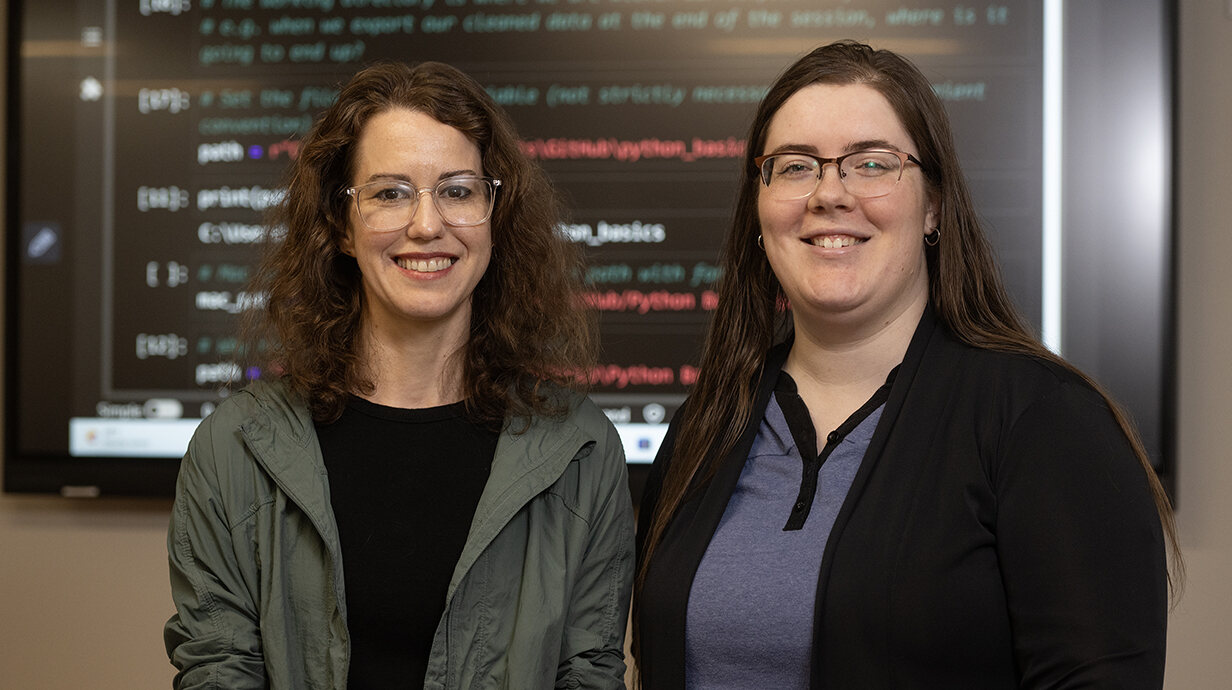Kelly, Watson to run workshops, offer mini research grants with $40,000 award

Shelby Watson (right) and Savannah Kelly
APRIL 23, 2024
The University of Mississippi Libraries can help researchers with unprecedented access to a massive trove of medical data, thanks to an award from the National Institutes of Health.
The University of Mississippi has been selected as one of 10 institutions for the second cohort of the All of Us Data Training and Engagement for Academic Libraries Program.
UM Libraries received the $40,000 All of Us Academic Libraries Program award. Library faculty Savannah Kelly and Shelby Watson will offer workshops for both beginning and veteran researchers on how to use the dataset. They will also offer mini research grants to Ole Miss faculty and students who propose research projects using the set of data.
“It seemed like a great opportunity,” said Watson, visiting assistant professor for scholar support. “It was specifically aimed at academic libraries. It let us take advantage of our data and technical skills, and we thought it would be a good fit for a lot of the people on campus and the research that they do.”
The National Institutes of Health‘s All of Us Research Program is a historic effort to collect and study data from at least 1 million people living in the United States. The goal of All of Us is to speed up health research discoveries, enabling new kinds of individualized health care.
To make this possible, All of Us is building one of the world’s largest and most diverse sets of data for health research. The Researcher Workbench is the secure, cloud-based platform that houses the All of Us dataset.
Diversity is one feature that sets this archive apart from previous medical databases. Underrepresented communities make up 80% of the medical data, and at least half of the data comes from racial and ethnic minorities. This gives UM researchers a chance to better reflect Mississippians in biomedical research.
“One of the guidelines in the application was for institutions to express how their constituents were from underrepresented backgrounds in medicine,” said Kelly, data science and reproducibility librarian and associate professor. “And so, if you look at Mississippi, we tend to have folks coming from rural spaces, or people from underrepresented minority, socioeconomic or racial groups.”
Variety is another feature of the dataset. Among the data collected are survey responses, electronic health records and whole genome sequences.
“The whole goal of the project is to not just look at one thing,” Watson said. “We’re not just looking at genetics, we’re not just looking at lifestyle, we’re not just looking at the environment; it’s the combination of all of those things together.”
Faculty members in criminal justice, pharmacy, education and exercise science have already expressed interest in using the All of Us dataset for their research, Watson and Kelly said.
“The All of Us (dataset) provides us with an unprecedented opportunity to work with health data across hundreds of biomedical markers,” said Anne Cafer, associate dean of research, scholarship and graduate education for the College of Liberal Arts. “This provides a unique opportunity for our students and faculty to work with data that would have been cost-prohibitive to either access or develop. (The dataset is free to use, except for computational costs.)
“Because of the diversity of respondents and the types of health markers and behaviors tracked in this dataset, scholars at UM will have an opportunity to innovate and test new models for supporting community health. This innovation has the potential for significant impact in a health-vulnerable state like Mississippi.”
Supported by the National Library of Medicine, the Academic Libraries Program aims to help campus library faculty learn to use the All of Us Researcher Workbench platform and equips them with skills to teach others to use it. Kelly and Watson have the opportunity to build and strengthen the research capacity of the campus community and become skilled users of biomedical and public health data through engaging in this cohort.
While researchers can sign up to use the Researcher Workbench on their own, Kelly and Watson can ease the process. They have received training from NIH on its use, and they know the programming languages needed to use the data. Kelly can train researchers on how to analyze their data with R, and Watson with Python.
“Savannah and Shelby bring a wealth of experience and an eye to practice and implementation that will be critical to the success of our UM users of this data, so I’m very optimistic about our collective use of the (dataset) and subsequent impact of these inquiries,” Cafer said.
The All of Us Research Program Researcher Workbench offers access to a diverse, longitudinal dataset that can be used by students and faculty who may not have access to other health research sets of data.
The NIH has worked with research communities and community members to ensure a robust research protocol that respects participants and meets the needs of the research community. This dataset includes biological and social determinants of health data on a large, inclusive scale, that follows participants as they move, age and grow.
It is a resource for students and researchers in social sciences as well as biomedical and public health programs.
To learn more about research that has been conducted with All of Us, click here.
This document describes activities performed under an Award Agreement between Oak Ridge Associated Universities and the University of Mississippi.
This project received funding through the Oak Ridge Associated Universities in support of the National Institutes of Health, National Library of Medicine under agreement No. S-105105.000 Task Order 75N97022F00003 with BLH Technologies Inc. (Prime Contract No. 75N97020A00017).
All of Us, the All of Us logo, and “The Future of Health Begins with You” are service marks of the U.S. Department of Health and Human Services.